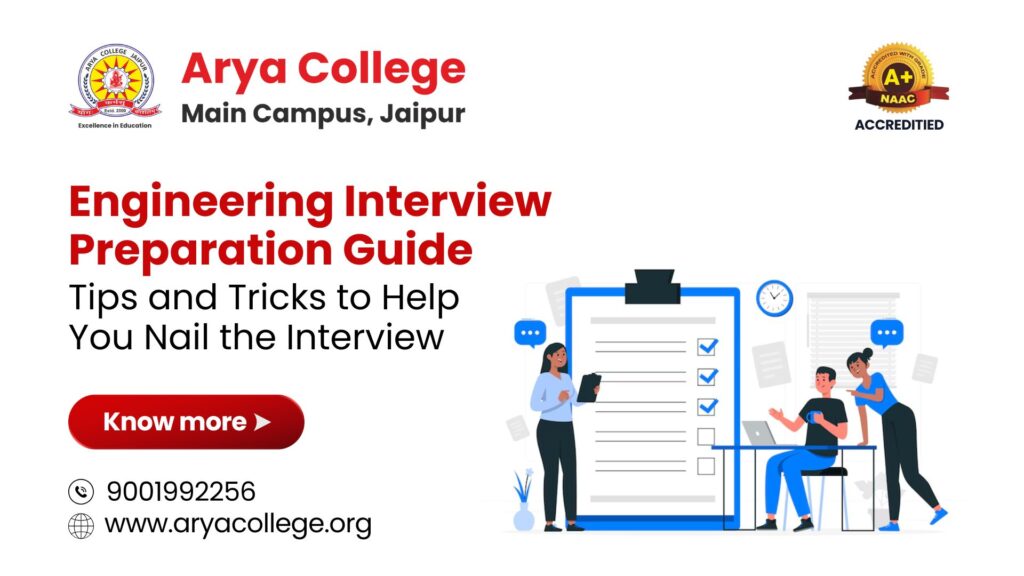Engineering Interview Preparation Guide: Tips and Tricks to Help You Nail the Interview
Are you preparing for an upcoming engineering interview? If so, you’re in luck! This blog post will provide you with tips and tricks that will help you ace the interview. We’ll cover everything from what to wear to how to answer common interview questions. So whether you’re a recent graduate or a seasoned professional, read on for advice that will help you stand out from the competition and land the job of your dreams.
One of the most important things to keep in mind when preparing for an engineering interview is that first impressions matter. Arya College main campus gives special training classes to students for interviews. In it, You want to dress in a way that shows you’re professional and confident. So avoid wearing jeans or anything too casual – instead, opt for slacks or a skirt with a button-down shirt. And make sure your shoes are clean and polished. With these tricks, you can easily groom yourself and get ready for the engineering Interviews.
How to prepare for the engineering interview
The engineering interview is one of the most important steps in getting a job in the engineering field. It is your chance to show off your skills and knowledge to potential employers and make a good impression.
Here are some tips on how to prepare for your engineering interview:
Do Your Research:
learn about the company you are interviewing with, their products or services, and their business model. This will help you answer questions about why you want to work for them and what you can bring to the table.
Know Your Stuff
brush up on your engineering knowledge before the interview. Be prepared to discuss statics, dynamics, mechanics, materials science, etc.
Practice Makes Perfect.
The engineering interview can be one of the most daunting experiences in a job seeker’s life. But with a little bit of preparation, it can be a breeze. Here are some tips to help you ace your next engineering interview:
Research, the company.
Learn about their products, their mission, and their values. This will help you prepare for questions about the company, but it will also give you a better sense of whether or not the company is a good fit for you.
Prepare for behavioral questions
In addition to technical questions about your skills and experience, you will likely be asked behavioral questions about how you handle difficult situations. Be prepared to answer these questions with specific examples from your past experiences.
Examples of Common Engineering Interview Questions
Questions about your engineering experience are common in interviews. Here are some examples of questions you may be asked, and you can make preparation for engineering interviews:
- What types of engineering have you done?
- Where did you study engineering?
- What design projects have you worked on?
- What is your experience with CAD software?
- How did you become interested in engineering?
- Tell me about a time when you had to solve a difficult problem.
- Can you describe a project that required teamwork?
- What obstacles have you faced during your engineering career?
- How do you stay current with new developments in your field?
Answering these questions can help the interviewer learn more about your qualifications and how they match the job requirements. Be prepared to talk about your engineering experience in detail, and be ready to give examples of your work.
What are the Stages of the Engineering Interview
Preparation for engineering interviews usually involves four main parts: resume screening, the initial phone screen, the on-site interview, and reference checks.
- The first stage of an engineering interview is resume screening. In this stage, recruiters or hiring managers will look at your resume to see if you have the necessary skills and experience. If they believe you meet the basic requirements, they will move on to the next stage.
- The second stage is the initial phone screen. In this stage, recruiters or hiring managers will ask you questions about your qualifications and experience to better understand whether you are a good fit for the position. If they believe you are a good fit, they will move on to the next stage.
- The third stage is the on-site interview. You will be interviewed by a panel of engineers and managers in this stage. They will ask you questions about your qualifications and experience, as well as your engineering management philosophies and practices. If they believe you are a good fit, they will move on to the final stage.
- The fourth and final stage is reference checks. In this stage, recruiters or hiring managers will contact your references to get their thoughts on your qualifications and experience. They will also ask about your engineering management philosophies and practices. If they receive positive feedback from your references, you will likely be offered the position.
Also Read – How to prepare for the placement interview
What Should be the Dressing for the Engineering Interview
The dress for the interview of the engineering student is a suit with a shirt and tie. The color of the suit should be dark, such as navy or black. The shirt should be white, and the tie should be a conservative color. Avoid wearing bright colors or patterns. Dress shoes should be closed-toe and dark in color. Engineering students should look professional and polished for their interviews.
It is important to make a good impression on potential employers during an interview. Wearing the proper attire can help set you apart from other candidates and show that you are serious about the job opportunity.
While there is no one-size-fits-all answer for what to wear to an interview, as an engineering student, you should err on the side of caution and dress conservatively, and you have to prepare for engineering interviews. This means avoiding anything too flashy or revealing. Instead, stick to classic, professional clothing in neutral colors.
Your goal should be to look polished and put together. With the right outfit, you will project confidence and show that you are ready to take on the challenges of the job.
What Red Flags Should You be Aware of During an Engineering Interview?
As an engineer, you should always be on the lookout for red flags during interviews. Here are a few of the most common red flags:
- The interviewer seems disinterested in your engineering experience or qualifications.
- The interviewer asks leading questions that seem designed to trip you up.
- The interviewer doesn’t seem to understand basic engineering concepts.
- The company appears to be cutting corners in its engineering department.
If you encounter any of these red flags during an interview, it’s best to move on and look for another opportunity. Engineering is too important of a field to work in a place that doesn’t value it.
What are the Things That can be Noticed in Your Resume
When you’re putting together your resume for the preparation for engineering interviews, there are a few things you’ll want to keep in mind.
1. First, make sure that your resume is clear and concise. You don’t want to overwhelm potential employers with too much information. Stick to the basics: your contact information, work experience, education, and skills.
2. Next, take a close look at your language. Be sure to use strong action verbs to describe your previous experiences. For example, instead of saying, “I helped out with sales,” you could say, “I increased sales by X%.” Employers are looking for candidates who can take the initiative and get results, so make sure your resume reflects that.
3. Finally, pay attention to the format of your resume. Make sure it is easy to read and looks professional. If your resume is cluttered or difficult to read, employers will likely move on to the next one.
By following these tips, you can be sure that your resume will make a great impression on potential employers. So take the time to put together a strong resume, and you’ll be one step closer to landing your dream job.
Conclusion
The preparation for an engineering interview question is a great way to learn about a potential employee’s engineering ability. It can help you identify their strengths and weaknesses, as well as give you an idea of how they would approach problems. However, it is important to remember that this is only one tool in the hiring process and should not be used as the sole basis for your decision.
If you’re looking for someone with strong engineering skills, then the engineering interview question is a great way to assess them. Just make sure to consider all of the other factors in your hiring decision as well. Thank you for reading! I hope this article was helpful.





